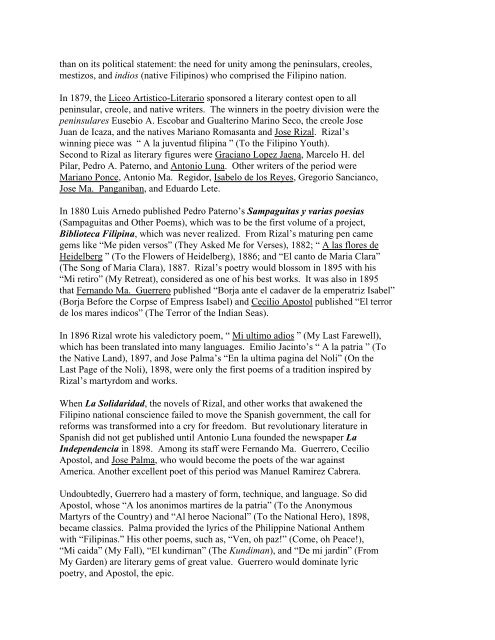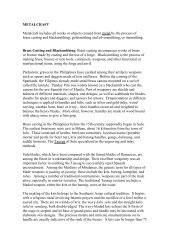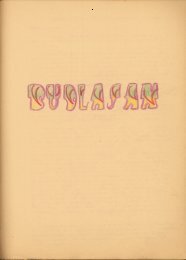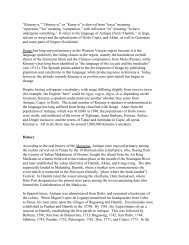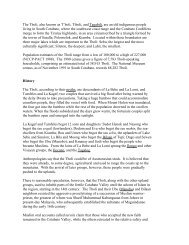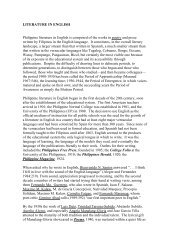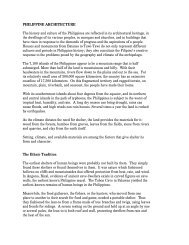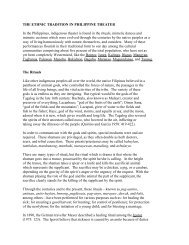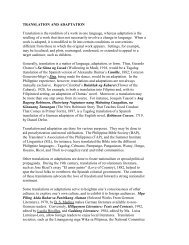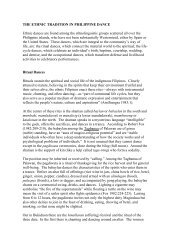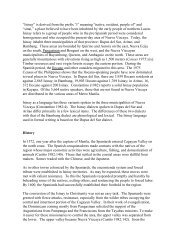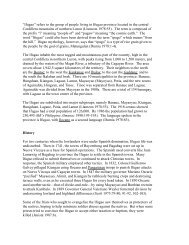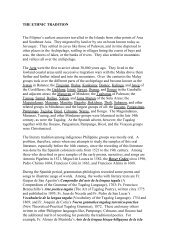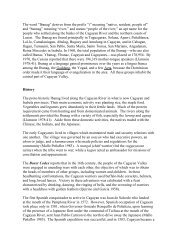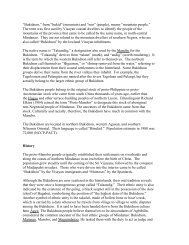LITERATURE IN SPANISH Philippine literature in Spanish includes ...
LITERATURE IN SPANISH Philippine literature in Spanish includes ...
LITERATURE IN SPANISH Philippine literature in Spanish includes ...
Create successful ePaper yourself
Turn your PDF publications into a flip-book with our unique Google optimized e-Paper software.
than on its political statement: the need for unity among the pen<strong>in</strong>sulars, creoles,<br />
mestizos, and <strong>in</strong>dios (native Filip<strong>in</strong>os) who comprised the Filip<strong>in</strong>o nation.<br />
In 1879, the Liceo Artistico-Literario sponsored a literary contest open to all<br />
pen<strong>in</strong>sular, creole, and native writers. The w<strong>in</strong>ners <strong>in</strong> the poetry division were the<br />
pen<strong>in</strong>sulares Eusebio A. Escobar and Gualter<strong>in</strong>o Mar<strong>in</strong>o Seco, the creole Jose<br />
Juan de Icaza, and the natives Mariano Romasanta and Jose Rizal. Rizal’s<br />
w<strong>in</strong>n<strong>in</strong>g piece was “ A la juventud filip<strong>in</strong>a ” (To the Filip<strong>in</strong>o Youth).<br />
Second to Rizal as literary figures were Graciano Lopez Jaena, Marcelo H. del<br />
Pilar, Pedro A. Paterno, and Antonio Luna. Other writers of the period were<br />
Mariano Ponce, Antonio Ma. Regidor, Isabelo de los Reyes, Gregorio Sancianco,<br />
Jose Ma. Panganiban, and Eduardo Lete.<br />
In 1880 Luis Arnedo published Pedro Paterno’s Sampaguitas y varias poesias<br />
(Sampaguitas and Other Poems), which was to be the first volume of a project,<br />
Biblioteca Filip<strong>in</strong>a, which was never realized. From Rizal’s matur<strong>in</strong>g pen came<br />
gems like “Me piden versos” (They Asked Me for Verses), 1882; “ A las flores de<br />
Heidelberg ” (To the Flowers of Heidelberg), 1886; and “El canto de Maria Clara”<br />
(The Song of Maria Clara), 1887. Rizal’s poetry would blossom <strong>in</strong> 1895 with his<br />
“Mi retiro” (My Retreat), considered as one of his best works. It was also <strong>in</strong> 1895<br />
that Fernando Ma. Guerrero published “Borja ante el cadaver de la emperatriz Isabel”<br />
(Borja Before the Corpse of Empress Isabel) and Cecilio Apostol published “El terror<br />
de los mares <strong>in</strong>dicos” (The Terror of the Indian Seas).<br />
In 1896 Rizal wrote his valedictory poem, “ Mi ultimo adios ” (My Last Farewell),<br />
which has been translated <strong>in</strong>to many languages. Emilio Jac<strong>in</strong>to’s “ A la patria ” (To<br />
the Native Land), 1897, and Jose Palma’s “En la ultima pag<strong>in</strong>a del Noli” (On the<br />
Last Page of the Noli), 1898, were only the first poems of a tradition <strong>in</strong>spired by<br />
Rizal’s martyrdom and works.<br />
When La Solidaridad, the novels of Rizal, and other works that awakened the<br />
Filip<strong>in</strong>o national conscience failed to move the <strong>Spanish</strong> government, the call for<br />
reforms was transformed <strong>in</strong>to a cry for freedom. But revolutionary <strong>literature</strong> <strong>in</strong><br />
<strong>Spanish</strong> did not get published until Antonio Luna founded the newspaper La<br />
Independencia <strong>in</strong> 1898. Among its staff were Fernando Ma. Guerrero, Cecilio<br />
Apostol, and Jose Palma, who would become the poets of the war aga<strong>in</strong>st<br />
America. Another excellent poet of this period was Manuel Ramirez Cabrera.<br />
Undoubtedly, Guerrero had a mastery of form, technique, and language. So did<br />
Apostol, whose “A los anonimos martires de la patria” (To the Anonymous<br />
Martyrs of the Country) and “Al heroe Nacional” (To the National Hero), 1898,<br />
became classics. Palma provided the lyrics of the <strong>Philipp<strong>in</strong>e</strong> National Anthem<br />
with “Filip<strong>in</strong>as.” His other poems, such as, “Ven, oh paz!” (Come, oh Peace!),<br />
“Mi caida” (My Fall), “El kundirnan” (The Kundiman), and “De mi jard<strong>in</strong>” (From<br />
My Garden) are literary gems of great value. Guerrero would dom<strong>in</strong>ate lyric<br />
poetry, and Apostol, the epic.


